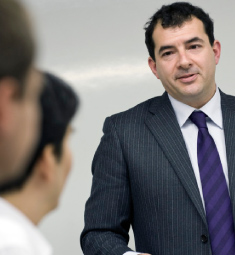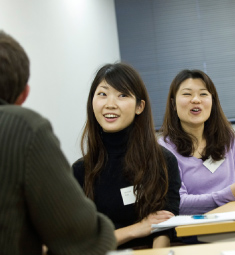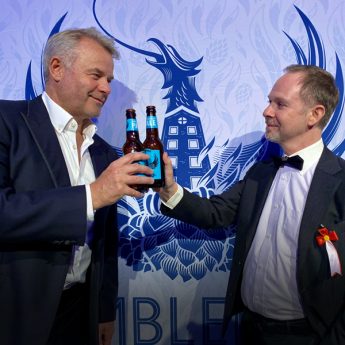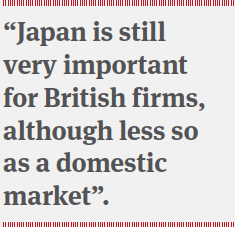Tension as participants are told their teams and clients
• More Japanese participants than ever before
• Number of women also increasing—now at 36%
• Competition helps foreign firms, young executives
You could cut the atmosphere with a knife. Perched on the edge of their seats, the competition participants are on tenterhooks; the proverbial envelope is ready to be opened. You can almost hear the roll of a drum and the voice over the loudspeaker announce: “And the winner is …”
Only, there is no winner—well, at least not at this stage.
The announcer and envelope opener Pierre Couret is rummaging through some papers, adding to the tension, before finally revealing what the seven members of Team B in the Japan Market Expansion Competition (JMEC) 18 have been anxiously waiting to hear.
“And your client is …”
There follows a gasp, a muted squeal, a “wow!” and a look of utter astonishment. Team B has landed a big fish.

Programme Director Pierre Couret: JMEC has produced some remarkable success stories.
Similar scenes ensue in a number of rooms around Temple University Japan’s Azabu campus, where the 47 participants of JMEC 18 have gathered on this chilly January afternoon to learn two long-awaited pieces of information: with which team he or she will be affiliated, and for which corporation their newly assembled unit will be creating a business plan.
This is the day when it all starts to happen for JMEC participants, says Couret, programme director of the business plan competition. “January 14 is a day they’ll probably always remember,” he said. “This is when the real work begins”.
Few JMEC graduates would disagree. Now in its 18th year, the programme was inaugurated by the Australian and New Zealand Chamber of Commerce in Japan as a training tool to help foreign businesses enter, and expand in, the Japanese market.
That basic tenet carries to this day, with the added objective of strengthening the skills of young business executives already living and working here by providing professional coaching in the art of business-plan production.
“Participants are ambitious English-speaking individuals from around the globe who want to sharpen their business skills and build networks,” said Couret, from Toulouse in France.
“They have to be extremely motivated because, overall, it takes a huge amount of commitment, resources and sheer strength of will to get through the programme”.
JMEC is spread over seven months, with the first half consisting of lectures and workshops on Saturdays given by seasoned expat business executives that prepare participants for the practical content of the latter stages.
The results are impressive. To date, 848 participants from 45 countries have gone through the programme. Among them, they have masterminded 159 business plans for a variety of clients, from large corporations to venture startups.
And these are no hypothetical, door stopper-bound trials or theoretical models. Remarkably, more than two-thirds have actually been implemented.

Women make up 36% of JMEC 18 participants
“That’s one big motivation”, said British participant Stephen Parker. “I am working for a business, but I have never formerly studied business and this made it sound really exciting. Something like [the British reality TV series] ‘The Apprentice’”.
Uniting all participants, of course, is the fact that they already have served their apprenticeships. One of the requirements of the programme is a track record of working in Japan for one or two years.
Yet, the backgrounds of participants and their motives for joining the programme couldn’t be more diverse.
“I’m tired of having someone else’s vision becoming my vision”, said Michaela Chatman, a former special needs teacher in New York who currently works at an international school in Tokyo. “I have my own vision and have tried implementing that in the past through various projects. The problem was I didn’t have the solid business skills to start my own business”.
That is where JMEC comes into its own, says fellow participant Carlos Aquino. “Ideas are important, but you also need the skills, the networking, and so on”, said Aquino. “JMEC gives you that. It’s like a magnet for people who are ready to really do something”.
JMEC has produced some remarkable success stories, according to Couret. One Indian graduate went on to set up his own IT venture. His wife, who graduated the same year, has done the same back in their homeland. They also have since opened a chain of restaurants in Tokyo.
“Naturally, participants try to leverage what they learn through JMEC either to get better positions within their firm or to move on”, he said. “For some, it has been a revelation. Most alumni say it had a tremendous impact on their lives”.
This probably is aided by the illustrious businesspeople who JMEC lists as lecturers and coaches. One is Anne Good, executive, career and life coach at Eureka!. For eight years she has lectured at JMEC on the subject of how to hold and conduct effective meetings.
Good, a human resources professional who has experience working as an HR advisor and personal development consultant for numerous multinationals and entrepreneurial enterprises, has the unenviable task of delivering the very last lecture in the programme—unenviable because it falls smack between the announcement of the teams and Couret’s drama-filled client announcement.
“To you all, I’m a pain in the neck,” she told them at the beginning of her talk. “I know it is not where any of you want to be right now”.
It’s a memorable start to a thought-provoking two-hour session. To maintain interest levels, Good has a secret weapon: a bag filled with chocolates, together with a healthy helping of infectious humour. “Answer a question, and you will be rewarded”, she told the participants.
“Seems I needn’t have worried; they were very responsive”, she told ACUMEN afterwards, holding her colourful cloth bag, now almost empty of confectionary. “I’m lucky in a way: I get them when they’re at their most cohesive, when they’ve had time to get it all together”.
Good admits to another happy surprise. This year, for the first time, the number of Japanese participants is greater than that of non-Japanese, something she has been noticing in her consultancy business as well.
“Foreigners can tend to dominate proceedings, but having more Japanese seemed to increase the Japanese contingent’s participation [in the lecture]”, she added.
“I’m happy this dynamic has come about. Perhaps we will see some interesting results”.
Couret agrees, saying it may be an indication of the growing reputation JMEC is enjoying. “I believe this also suggests a growing awareness of, and interest in, global business practices among younger Japanese”. Another development this year is the elevated number of participating women: accounting for 36% of participants.
As both a young Japanese and a woman, Mika Matsunaga believes that this trend reflects a general shaking awake of the Japanese population following the devastating Tohoku earthquake last March, followed by the departure of many expats from the country.
“I am not sure if there is really a good or bad time to look for a change, but I believe [March] was a wake-up call”, said the account executive for PR firm Cosmos, who hopes JMEC will help her one day to hone her skills with an international NPO. “Like many people, I have a goal; and JMEC has helped me maintain my focus on that”.



